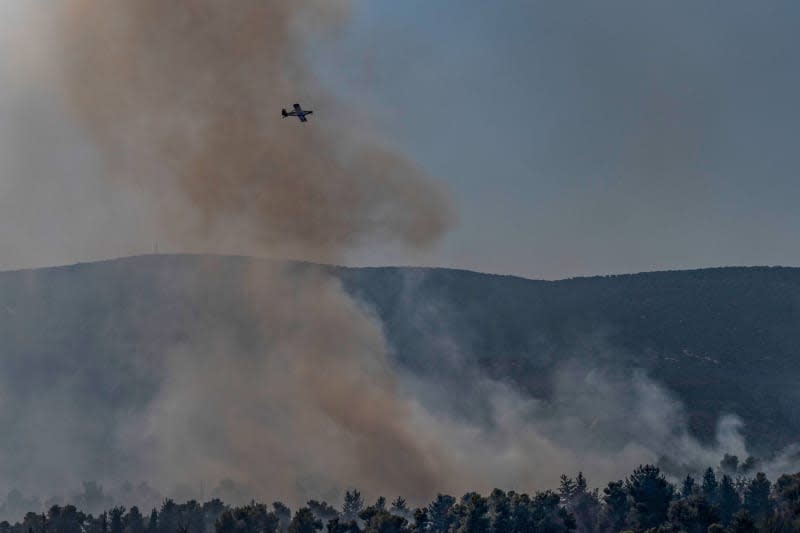Israel tells troops to prepare for possible Lebanon ground offensive
Israel’s military chief told troops to prepare for a possible ground offensive in Lebanon as heavy Israeli airstrikes continued for a third day and militants targeted the cities of Tel Aviv and Eilat.
The strikes on Lebanon, and the subsequent reduction in the military power of the Shiite militia group Hezbollah, have laid the foundation for a possible ground incursion, Israel Defense Forces’ chief of staff Herzi Halevi told troops on Wednesday.
“You hear the jets overhead; we have been striking all day,” the IDF chief said as he visited a troop exercise on the northern border, according to a military statement.
“This is both to prepare the ground for your possible entry and to continue degrading Hezbollah,” he said.
Earlier Ori Gordin, the IDF commander for the north, said the army was mobilizing two more reserve brigades for missions in the northern area and that troops must be ready for a ground manoeuvre.
“We have entered a new phase in the operation,” he said. Israel must “change the security situation, and we must be fully prepared for manoeuvres and actions.”
Israel’s goal is to return the some 60,000 people displaced from their homes in the north due to the near daily attacks by Iran-backed Hezbollah.
The cross-border clashes have taken place for more than 11 months and have also displaced thousands of Lebanese from their homes.
Hezbollah sources said the militia fighters were “ready to confront any possible ground invasion.”
Military conflict heats up, death toll rises
Israeli strikes on Wednesday morning killed 51 people and injured more than 200, the Lebanese Health Minister Firass Abiad said. Overall some 600 people have been killed since the escalation began on Monday, the ministry said.
The latest attacks struck towns and villages in the south of the country and also north of Beirut.
Front line action saw not only more Israeli strikes in Lebanon, but a Hezbollah strike – for the first time – on the Israeli metropolis of Tel Aviv. The IDF said it intercepted the rocket.
In the evening the southern port city of Eilat was attacked by two drones. One was intercepted while the other hit the harbour and exploded, injuring two people and sparking a fire, Hagari said.
Reports said they could have been launched from Iraq. Hagari did not comment on that. The Iran-backed Houthi rebels in Yemen have repeatedly targeted the Israeli southern port city.
But Halevi, acknowledging Hezbollah’s unprecedented rocket attack on Tel Aviv, said: “Today, Hezbollah expanded its range of fire, and later today, they will receive a very strong response. Prepare yourselves.”
Hezbollah declared that the rocket was aimed at the headquarters of Israel’s foreign intelligence service Mossad in a suburb of Tel Aviv.
Mossad, it said, was responsible for the assassination of several of the militia’s leaders and for the evidently coordinated mass explosions of communication devices used by Hezbollah in Lebanon last week.
Around 110 missiles were fired from Lebanon and some of them were intercepted, the Israeli military said. One rocket fell near an assisted living facility near Safed in the north; there were no injuries.
Hezbollah hiding behind Lebanese civilians
Observers and ex-military personnel in Lebanon affirmed the Israeli military’s accusation that Hezbollah is hiding weapons in residential areas.
“[Hezbollah] has no barracks or places to store their weapons because Israel will detect them,” said former Lebanese army brigadier Wehbe Katischa, who served in southern Lebanon.
“That’s why their most important depots are located between houses and in mountainous areas near residential areas.”
The Hezbollah militia had an estimated 150,000 missiles in the region before the start of the Gaza war almost a year ago. Israel’s military repeatedly said that the attacks in Lebanon would target the militia’s weapons depots.
Israel has long accused Hezbollah of hiding weapons in residential areas and of manufacturing rockets there. The Lebanese government has tried to refute some of these accusations.
Thousands displaced in Lebanon
Meanwhile at least 90,530 people have been displaced since Monday, including nearly 40,000 in 283 shelters, the United Nations reported.
It said nearly 600 have been killed, including 50 children and 94 women in nearly 1,700 strikes across the country. Humanitarian organizations urgently require at least $170 million to sustain ongoing response and respond to new needs, the UN said.
The International Committee of the Red Cross (ICRC) said on Wednesday that international humanitarian law made it clear that care must be taken at all times to spare the civilian population and civilian objects when carrying out military operations.
No signs of an Iranian military intervention to date
Iran’s supreme leader expressed confidence that Hezbollah shows no signs of defeat, despite the loss of high-ranking commanders in Israeli attacks. However, he made no mention of Iran taking a more active role in the ongoing conflict.
“Without doubt it was a loss for Hezbollah, but it was not a loss that would bring about its defeat,” Ayatollah Ali Khamenei said at a veterans’ event in Tehran on Wednesday.
Iranian Foreign Minister Abbas Araghchi warned against underestimating Hezbollah. “It is more than capable of destroying the bases and colonies of the Israeli regime,” he wrote on the X platform.
Hezbollah has been considered Iran’s most important ally in the Middle East, but observers say it uncertain that Tehran would rush to its aid in the event of war between it and Israel.

